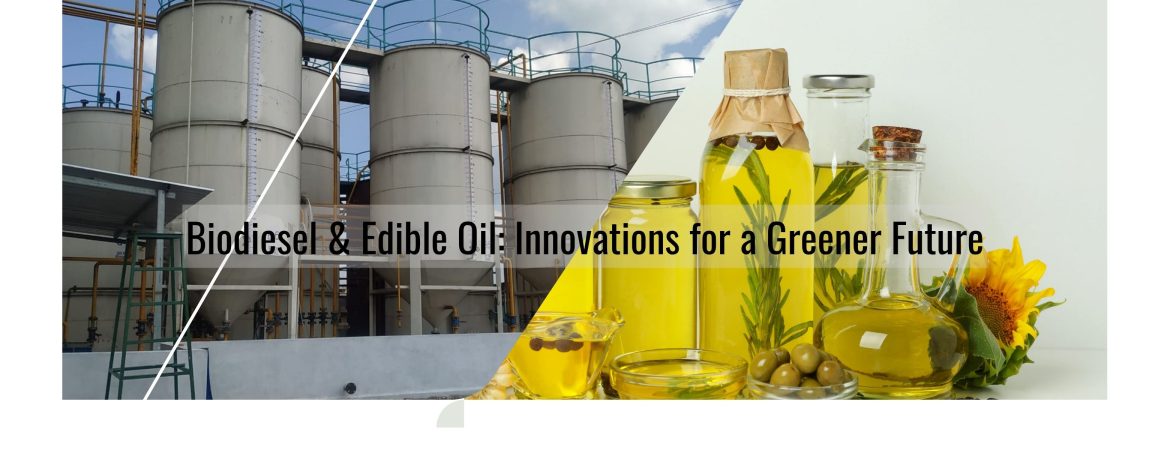The edible oil industry and the biodiesel sector are becoming increasingly interconnected. With global demand for sustainable energy on the rise, edible oil by-products and low-value streams are now key feedstocks for biodiesel plants. Companies like Pemac Projects are leveraging advanced oil refining and biodiesel technologies to create integrated facilities that maximize yield, reduce waste, and contribute to a circular economy.
From Edible Oil to Renewable Fuel
Traditionally, edible oils such as soybean oil, sunflower oil, rice bran oil, and palm oil have been refined through processes like degumming, neutralizing, bleaching, dewaxing/winterizing, deodorizing, and fractionation to produce high-quality food-grade oils. However, many by-products—like acid oil, soapstock, palm fatty acid distillate (PFAD), and used cooking oil (UCO)—have limited edible applications.
Instead of going to waste, these side streams are now valuable feedstocks for biodiesel production, providing both cost savings and environmental benefits.
Advanced Feedstock Processing
- 1. Pretreatment of High-FFA Oils
Low-cost feedstocks such as UCO, PFAD, and acid oil often contain high free fatty acids (FFA) and impurities. Advanced pretreatment systems—including acid esterification, dry degumming, vacuum drying, and adsorptive bleaching—are used to lower FFA and moisture levels, making oils suitable for transesterification.
- 2. Process Intensification
Modern biodiesel plants integrate:
- – Ultrasonic and microwave-assisted reactors for faster reaction times.
- – Heterogeneous solid catalysts (like CaO and MgO) to reduce wastewater and simplify separation.
- – Reactive distillation and supercritical methanol technologies for higher efficiency and cleaner fuel.
- – These innovations not only improve FAME yield but also lower operational costs.
- 3. Enzymatic Biodiesel Production
For oils with highly variable quality, enzymatic transesterification using immobilized lipases offers flexibility. It minimizes soap formation, produces higher-purity biodiesel, and simplifies glycerine recovery, an essential co-product in both biodiesel and oleochemicals.
Integration with Edible Oil Refineries
An integrated edible oil refinery and biodiesel plant brings multiple benefits:
- – Higher profitability: Turning by-products (PFAD, soapstock, acid oil) into biodiesel instead of selling them at low prices.
- – Better resource utilization: Minimizing waste through oil filtration, fractionation, and glycerine refining.
- – Sustainability: Reducing reliance on fossil fuels while supporting renewable energy policies in India, Africa, and worldwide.
- – Market flexibility: Switching between food oil and biofuel streams depending on market prices and demand cycles.
At Pemac Projects, we specialize in designing modular biodiesel plants that align seamlessly with edible oil refinery operations, ensuring maximum return on investment.
Environmental & Economic Benefits
- – Lower Carbon Footprint – Biodiesel from edible oil by-products reduces GHG emissions by up to 80% compared to fossil diesel.
- – Energy Security – Countries like India and African nations can reduce crude oil imports by using locally available feedstocks.
- – Circular Economy – By transforming waste cooking oil and distillates into clean fuel, industries move toward zero-waste operations.
- – Co-product Utilization – Refined glycerine is a valuable input in pharmaceuticals, cosmetics, and food industries.
Future Outlook
The edible oil and biodiesel industries are set to merge even further. Next-generation technologies—such as algae-based biodiesel, waste-to-energy integration, and AI-powered process optimization—will play a major role. With government mandates and consumer demand for green fuels increasing, investing in biodiesel plants integrated with edible oil refineries is no longer just an option—it’s a necessity.
If you have any queries or need more information about Edible oil refinery plants, solvent extraction plants or oil expeller plants feel free to contact us.



Leave A Comment